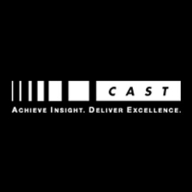

SonarQube and CAST Application Intelligence Platform are competing products in code quality and software analysis. SonarQube seems to have advantages in pricing and support due to its flexibility and easier customer service, while CAST provides superior features with a high level of detail in analytics.
Features: SonarQube provides robust static code analysis, continuous integration support, and a focus on code quality, making it ideal for development teams. CAST offers detailed architecture analysis, insights into software health, and caters to enterprises needing comprehensive application understanding with its extensive analytical capabilities.
Ease of Deployment and Customer Service: SonarQube is generally straightforward to deploy with flexible installation options and accessible service. CAST entails more deployment complexity due to its advanced features and benefits from dedicated support mechanisms. Customers often prefer SonarQube for its simplicity, while CAST is chosen for thoroughness despite the setup effort.
Pricing and ROI: SonarQube offers a cost-effective solution with faster ROI attributed to lower upfront costs, making it attractive for budget-conscious teams. CAST, requiring a larger initial investment, justifies the expense with superior features, delivering significant long-term ROI for enterprises seeking in-depth analysis, with decisions often influenced by budget constraints versus detailed insights needed.
| Product | Market Share (%) |
|---|---|
| SonarQube | 40.9% |
| CAST Application Intelligence Platform | 6.6% |
| Other | 52.5% |
| Company Size | Count |
|---|---|
| Small Business | 41 |
| Midsize Enterprise | 24 |
| Large Enterprise | 79 |
CAST Application Intelligence Platform (AIP), a result of over $130M in R&D investment over two decades, is an enterprise-grade software measurement and quality analysis solution designed to analyze multi-tiered, multi-technology applications for technical vulnerabilities and adherence to architectural and coding standards and then provide business relevant information to the IT organization through various dashboards and products built with end users in mind.
CAST’s underlying system-level analysis technology assesses both the health of an application, as measured through numerous health factors, as well as specific structural and system-level defects that drive performance and stability issues providing true system level analysis.
SonarQube leads automated code review, enhancing code quality and security in AI-driven SDLCs. It analyzes pull requests, providing developers with actionable feedback and AI-driven fixes before code merges. Trusted by top enterprises, it supports SaaS and self-managed deployments.
SonarQube supports a wide range of programming languages and integrates seamlessly with CI/CD tools like Jenkins. It is renowned for its static code analysis, code coverage, and security vulnerability detection. While its open-source foundation and scalability are praised, users seek enhanced integration across multiple languages, better security features, and improved documentation. Despite challenges, its ability to automate code inspections and ensure compliance with coding standards makes it essential in software development processes, facilitating continuous improvement.
What are the most important features?In industries like finance, healthcare, and automotive, SonarQube is leveraged for static code analysis, automating code inspections, and ensuring compliance with stringent standards. Teams integrate it into their CI/CD pipelines to maintain high-quality code, identify security vulnerabilities, and enhance code maintainability.
We monitor all Software Development Analytics reviews to prevent fraudulent reviews and keep review quality high. We do not post reviews by company employees or direct competitors. We validate each review for authenticity via cross-reference with LinkedIn, and personal follow-up with the reviewer when necessary.